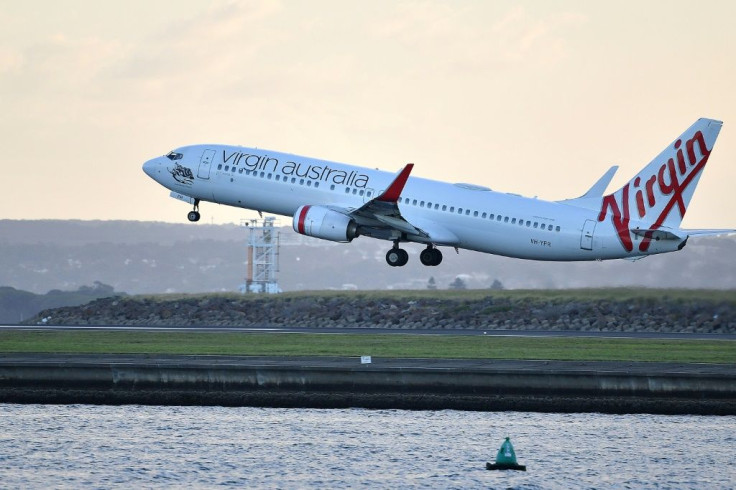Virgin Australia Airline Collapses After Government Refuses Bailout Request

KEY POINTS
- Virgin Australia has 130 aircraft and a total workforce of 10,000
- Virgin Australia is controled by five shareholders based outside of Australia
- Virgin Australia emerged as the principal domestic rival to Qantas
Sir Richard Branson has criticized the Australian government for refusing to provide a lifesaving $877 million loan to Virgin Australia airlines, thereby forcing the carrier into declaring bankruptcy.
"In most countries federal governments have stepped in ... sadly, that has not happened in Australia," Branson said.
Virgin Australia – in which Branson has a 10% stake – went into voluntary administration on Tuesday due to the devastating impact of the coronavirus pandemic. It is Australia’s second largest airline after Qantas and will operate a restricted schedule with skeleton crew.
Virgin Australia has 130 aircraft and a total workforce of 10,000.
"Virgin Australia has entered voluntary administration to recapitalize the business and help ensure it emerges in a stronger financial position on the other side of the Covid-19 crisis," the company said in a statement.
Virgin Australia, which was founded by Branson in 2000, also includes Etihad Airways of Abu Dhabi, Singapore Airlines and Chinese investment conglomerates Nanshan Group and HNA Group as shareholders.
Remarking on Virgin Australia’s heavy foreign ownership, Australia’s Treasurer Josh Frydenberg said his “government was not going to bail out five large foreign shareholders with deep pockets who together own 90% of this airline.”
Thus, Virgin Australia became one of the first major airlines to seek bankruptcy protection as a result of the pandemic. It is also the first major corporate casualty of the virus in Australia.
The company is now in the hands of its administrators, Deloitte, who will seek other ways to save the airline.
“Our intention is to undertake a process to restructure and refinance the business and bring it out of administration as soon as possible,” said Vaughan Strawbridge of Deloitte.
Deloitte will seek to restructure the airline's debt, pay off creditors and find a new buyer, most likely private equity groups.
Branson’s anger likely arises from the fact that the British government – which has thus far refused to bail out his Virgin Atlantic airlines – has offered financial support to budget airlines Wizz Air and EasyJet.
Meanwhile, Branson told Virgin Australia employees that this is "not the end for Virgin Australia, but I believe a new beginning. Never one to give up, I want to assure all of you – and our competitor – that we are determined to see Virgin Australia back up and running soon.”
Branson was referring to the carrier’s main rival in Australia, Qantas.
Qantas had earlier snarked that if Virgin Australia received a government loan, then Qantas was entitled to a bailout three times larger, given that it is thrice the size of Virgin Australia.
Even before the emergence of the pandemic, Virgin Australia had been struggling to repay some $3.17 billion in long-debt while incurring annual losses.
Still, despite the airline’s huge problems, both the Australian government and public worry that if and when Virgin Australia disappears, Qantas will have a virtual monopoly in Australia’s domestic air travel market.
"Australia needs a second [domestic] airline and we are determined to keep flying," said Virgin Australia chief executive Paul Scurrah.
Virgin Australia had controlled about 31% of Australia’s domestic flight market, while Qantas had around 58%.
Prime Minister Scott Morrison seems optimistic that Virgin Australia will be quickly restructured, but remained adamant that state aid would not be forthcoming. Morrison said he was pleased that “10 parties have shown interest" in Virgin Australia's future and that they have approached administrators to discuss deals.
“If we'd not taken the actions that we have and not demonstrated the patience that we have, then all we may have ended up doing is sending $1 billion to [Virgin Australia’s] foreign shareholders and that was never part of my plan,” Morrison said. “Our plan was always about seeing two viable airlines on the other side [of administration].”
However, Australia’s opposition lawmakers and union bosses had urged the government to bail out Virgin Australia in order to preserve jobs and cheap domestic airfares.
“This crisis isn’t a result of market failure, it’s a result of a government decision to shut [down] the market,” opposition leader Anthony Albanese said. “That’s why talk of market-based solutions at the moment is a triumph of ideology over common sense.”
Analysts estimate that Qantas could gain an additional 9% to 28% of the domestic market, giving it leverage to increase air fares.
"Having Qantas do it alone for a few months or even a year would not be disastrous as everything is uncertain [regarding] COVID-19 anyway," said Rico Merkert, a professor of transport at the University of Sydney Business School.
Qantas’ former principal domestic rival, Ansett Australia (which was owned by Air New Zealand) collapsed in 2001.
Some analysts think Virgin Australia could flourish under a new streamlined ownership, freed from its current cumbersome structure.
"Having five different owners of very, very different shades obviously wasn't ideal. Getting them off the register would be great," said Peter Harbison, chairman emeritus for global aviation consultancy CAPA Center for Aviation.
"Australia still represents a great opportunity for aviation investors," said Brendan Sobie, an independent aviation analyst. "Long-term prospects are solid, particularly if the new airline focuses mainly on domestic [routes]."
© Copyright IBTimes 2025. All rights reserved.





















